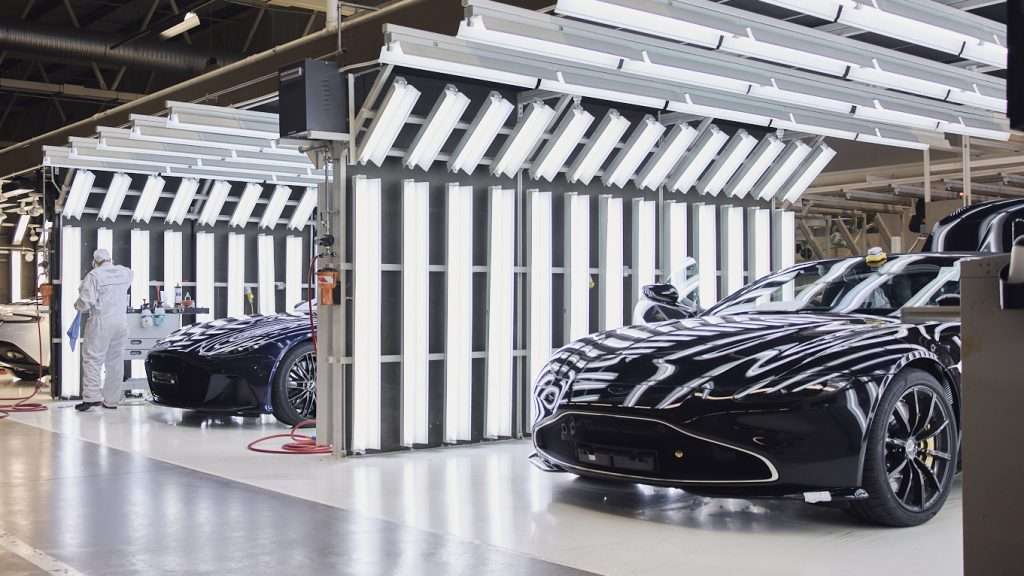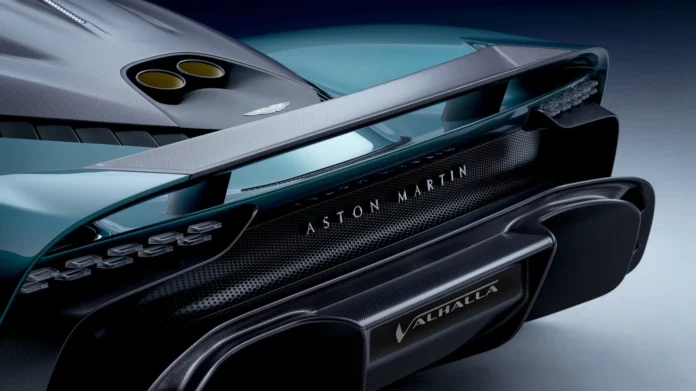British luxury carmaker Aston Martin is advancing its sustainability roadmap through its new “Green” plan.
Aston Martin has been working toward electrifying its fleet by 2024. By then, James Bond’s car of choice will either be fully electric or a hybrid engine, the carmaker says. It’s even working to electrify heritage cars so they are compliant with vehicle emissions regulations.
“We are transforming our products and the way they are manufactured to help tackle climate change,” the company says in its new Racing Green report.
A year after unveiling its aggressive Racing Green sustainability strategy, Aston Martin says it has achieved carbon-neutral manufacturing at its Gaydon and St Athan sites.
“We are aiming to achieve net-zero manufacturing facilities by 2030, and across our supply chain by 2039,” the carmaker says.

According to the company’s recent sustainability report, Aston Martin has made ongoing efforts to minimize its environmental footprint through company-wide initiatives aimed at lowering CO2 emissions from its manufacturing processes and extended supply chain.
Furthermore, the Racing Green initiative now includes offsetting both Scope 1 and Scope 2 emissions via Gold Standard-certified projects. This represents a significant milestone in Aston Martin’s pursuit of PAS 2060 certification by the end of 2023 and the establishment of net-zero manufacturing facilities by 2030.
The luxury carmaker says it is targeting zero single-use plastic waste across its manufacturing facilities by 2025, as well as a 15 percent reduction in water consumption by the same year. It will also maximize its use of sustainable materials inside vehicles. And, like fellow British luxury carmaker Bentley, Aston Martin says it will also improve biodiversity at its manufacturing facilities, “which are home to a host of species including birds such as the Grasshopper Warbler,” the report notes.
Decreasing emissions, accelerating clean energy
In collaboration with Climate Impact Partners, experts in carbon market solutions for climate action, Aston Martin’s emissions reduction program will fund projects that currently decrease CO2 emissions while facilitating the transition to a low-carbon global economy.
The car company is supporting wind power projects in Turkey, for example, which has already installed more than 120 wind turbines, generating around 575,000 MWh of clean electricity annually for a country heavily dependent on natural gas and oil, and whose infrastructure has been severely impacted by recent catastrophic earthquakes.
As part of its ongoing dedication to renewable energy, all Aston Martin manufacturing sites have been powered by 100 percent renewable electricity since 2019. To lessen reliance on the national power grid and enhance the clean electricity supply to others, the company is also dedicated to promoting new renewable energy projects at its locations.

This commitment is evident in the recent installation of solar panels at the iconic Aston Martin Works facility and heritage dealership in Newport Pagnell, supplying up to 90 percent of the site’s energy needs during summer. Plans are also in progress to add thousands of solar panels to the DBX SUV production plant in St Athan, potentially generating around 20 percent of the facility’s annual energy requirements.
Aston Martin says the Racing Green sustainability strategy has led to a 12.2 percent reduction in electricity consumption (MWh) across locations. The installation of LED lighting at St Athan has contributed to this decrease, saving over 24,000 kg of CO2 emissions annually.
Moreover, a 3.9 percent decline in CO2 emissions per vehicle produced in 2022 compared to 2021 was primarily driven by improved energy usage efficiency, including manufacturing enhancements resulting from the company’s optimized paint shop strategy.

Next year, the company will begin delivering Valhalla, its first Plug-in Hybrid Electric Vehicle, with its inaugural Battery Electric Vehicle planned for a 2025 launch and a fully electrified sports car and SUV lineup by 2030. True to form, the Valhalla EV is expected to deliver on speed like its predecessors. The car can go from zero to 60 mph in a nearly unprecedented 2.5 seconds. In the parlance of Aston Martin’s biggest fictional fan, that’s a velocity both shaken and stirred.
Amedeo Felisa, CEO of Aston Martin Lagonda, says the Racing Green sustainability strategy is guiding the carmaker’s transformation “as we act on our goals, making sustainability a core element of our operations.”
“While we need to accelerate progress in some areas, our continued focus on implementation, including the attainment of certified carbon neutral production, will enable us to realize our vision of becoming a world-leading sustainable ultra-luxury automotive enterprise,” Felisa said.
Earlier this month Aston Martin appointed Paul Thomas, a battery Electric Vehicle (BEV) technology leader, to the newly created position of BEV Chief Engineer. Thomas will be responsible for Aston Martin’s in-house specialist electrification team.
Related on Ethos:


